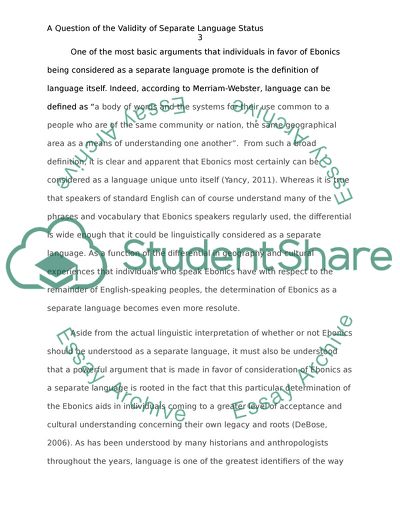Cite this document
(Ebonics: A Question of the Validity of Separate Language Status Coursework Example | Topics and Well Written Essays - 2000 words, n.d.)
Ebonics: A Question of the Validity of Separate Language Status Coursework Example | Topics and Well Written Essays - 2000 words. https://studentshare.org/psychology/1820507-present-arguments-pro-and-con-concerning-the-acceptance-of-ebonics-as-a-separate-language
Ebonics: A Question of the Validity of Separate Language Status Coursework Example | Topics and Well Written Essays - 2000 words. https://studentshare.org/psychology/1820507-present-arguments-pro-and-con-concerning-the-acceptance-of-ebonics-as-a-separate-language
(Ebonics: A Question of the Validity of Separate Language Status Coursework Example | Topics and Well Written Essays - 2000 Words)
Ebonics: A Question of the Validity of Separate Language Status Coursework Example | Topics and Well Written Essays - 2000 Words. https://studentshare.org/psychology/1820507-present-arguments-pro-and-con-concerning-the-acceptance-of-ebonics-as-a-separate-language.
Ebonics: A Question of the Validity of Separate Language Status Coursework Example | Topics and Well Written Essays - 2000 Words. https://studentshare.org/psychology/1820507-present-arguments-pro-and-con-concerning-the-acceptance-of-ebonics-as-a-separate-language.
“Ebonics: A Question of the Validity of Separate Language Status Coursework Example | Topics and Well Written Essays - 2000 Words”. https://studentshare.org/psychology/1820507-present-arguments-pro-and-con-concerning-the-acceptance-of-ebonics-as-a-separate-language.


